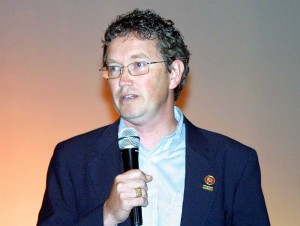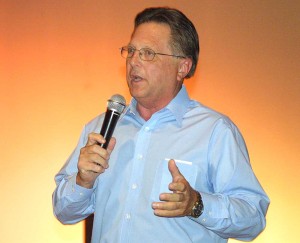Massie defends his voting record, gives insider’s view of Congress
By JIM BROOKS
Nelson County Gazette

Fourth District Congressman Rep. Thomas Massie speaks during the “Stand for Liberty” even Saturday night at Kreso’s Restaurant in Bardstown. The event was organized by the Bardstown/Nelson County Tea Party. Click image to enlarge. Photo by Jim Brooks.
Sunday, Sept. 16, 2013, 3 p.m. — Those who attended Saturday night’s “Stand for Liberty” event at Kreso’s were given a detailed — and at times, shocking — behind-the-scenes look at the way the U.S. House of Representatives operates from Kentucky’s 4th District freshman Congressman, Thomas Massie.
Approximately 75 people attended the event to hear Massie and local speakers discuss their views on making government more accountable to voters and how to elect candidates who will better represent the people.

Kenny Fogle, a member of the local Democratic executive committee, spoke during the “Stand for Liberty.” Click image to enlarge.
Massie said the media have had a hard time labeling him. “Even members of Congress are trying to figure out what to call me.”
Some call him a “libertarian-leaning Republican,” a “Constitutional conservative,” and “a Tea Party Congressman.”
“The one I like the best is when they call me “one of those 12 guys who didn’t vote for John Boehner,” he said, garnering cheers and applause from the audience.
Massie said Congress too often is distracted from important domestic issues like the debt limit by the news of the day. He compared Congress’ propensity for distraction to the players in a t-ball game. “Wherever the ball lands on the field is where all the players run.”
And right now, Congress has been distracted by a number of issues, including Syria. “How many of you have heard anything about our debt in the last six months? Virtually nothing.”
It is an important issue because Congress has been using extraordinary measures to keep the government funded, but those expire Oct. 15.
But there’s no real focus on the debt limit. “Nobody’s on the pitcher’s mound,” he said of Congress. “They’re all in the outfield talking about Syria.”
Massie described how the two-party system works in Congress, and how the process works to try to keep the individual parties voting as a single block.
While he said Congress structurally is designed for a two-party system, he said he would like to see a third-party created. “I think we should put John McCain, Lindsey Graham and Chris Cristie in it and call it ‘The Party of Irrelevance,” he quipped.
Party leaders on both sides have their ways of pressuring their respective members to vote the way the leadership wants, he explained. He told of one of his early votes was on a bill that wasn’t yet written. A staffer from the whip’s desk approached Massie to ask him how he planned to vote.
Party caucuses meet in a sound proof room to discuss upcoming legislation; the caucus leadership provides written speeches for members to give on the House floor which are often carried by C-SPAN, and members receive talking points which they can use in media interviews and in meetings with constituents.
During comment periods at these meetings, members who don’t want to go against the party leadership publicly on the House floor may do so outside the eyes and ears of media and their own staff. “The problem is when the one-minute timer is up, they thank you for your comment and ask ‘Next?’ Too often our party isn’t listening, and that’s going to get us into trouble.”
Massie said he understands the need to be a team player, but he reserves the right to disagree with the leadership’s plays. “My problem is that half the time, the quarterback is throwing the ball into the wrong end zone.”
Influencing Congress was another topic Massie addressed. He said the groups who create congressional scorecards — including the Club for Growth, FreedomWorks and HeritageAction — wield a surprising amount of influence. Members pay attention to the votes the groups are scoring, and some members game the system by voting the opposite way they normally would on a piece of legislation in order to improve their scorecard rating.
“It’s important to understand what these scorecards are scoring, and to understand there are ways to work the system,” he said.
Phone calls from constituents are one of the most important ways individuals can influence their congressman’s votes. “I can hear the phones ringing outside my office, and I know when there’s an issue important to the folks back in Kentucky.
“By the way, the phone calls in my office on Syria were running 500 against [a military strike] and 4 in favor,” he said. “It didn’t take me long to decide I was against it before I got back to Washington.”
The cliché that Congress only has two or three days to read a bill is an unfortunate truth, he said. “It’s a tactic the leadership uses to get legislation passed. They don’t want you to know what’s in it.”
House leadership sometimes uses classified briefings on issues to pressure lawmakers to vote against the opinions of their constituents.
“They don’t really tell you anything you can’t find out on the Drudge Report, but they say ‘you have more information than your constituents, so you can ignore their phone calls,'” Massie explained. The implication is that if constituents had the classified information, they would like change their opinion.
Lobbyists have tremendous influence on Congress, he said, citing the number of organizations and corporations who have lined up to support the Internet sales tax legislation now pending in the House. Big box retailers are in favor of the bill, and some of them have already cut deals with state governments who have agreed to rebate sales taxes back to the companies to those who have built regional distribution centers or other operations in their state. The online auction site eBay is the largest corporation that opposes the measure.
Massie said the Internet sales tax measure was unfair because it would subject businesses in one state to the regulations of another state. Businesses in one state could be subject to audit by regulators outside the state, he said.
“If this happens, it really is bad news,” he said of the tax measure. Many small Main Street business owners believe the tax will be a benefit to them, but that isn’t the case, Massie explained. “The folks lobbying on this have no interest in helping Main Street businesses.”
During a question-and-answer period, Massie underscored the importance of grassroots movements to oppose or support legislation in Congress.
“Nothing good happens in Washington, D.C. without forces from outside the Beltway,” he explained. “if there’s not enough public outcry about something there’s nothing we can do.”
-30-





